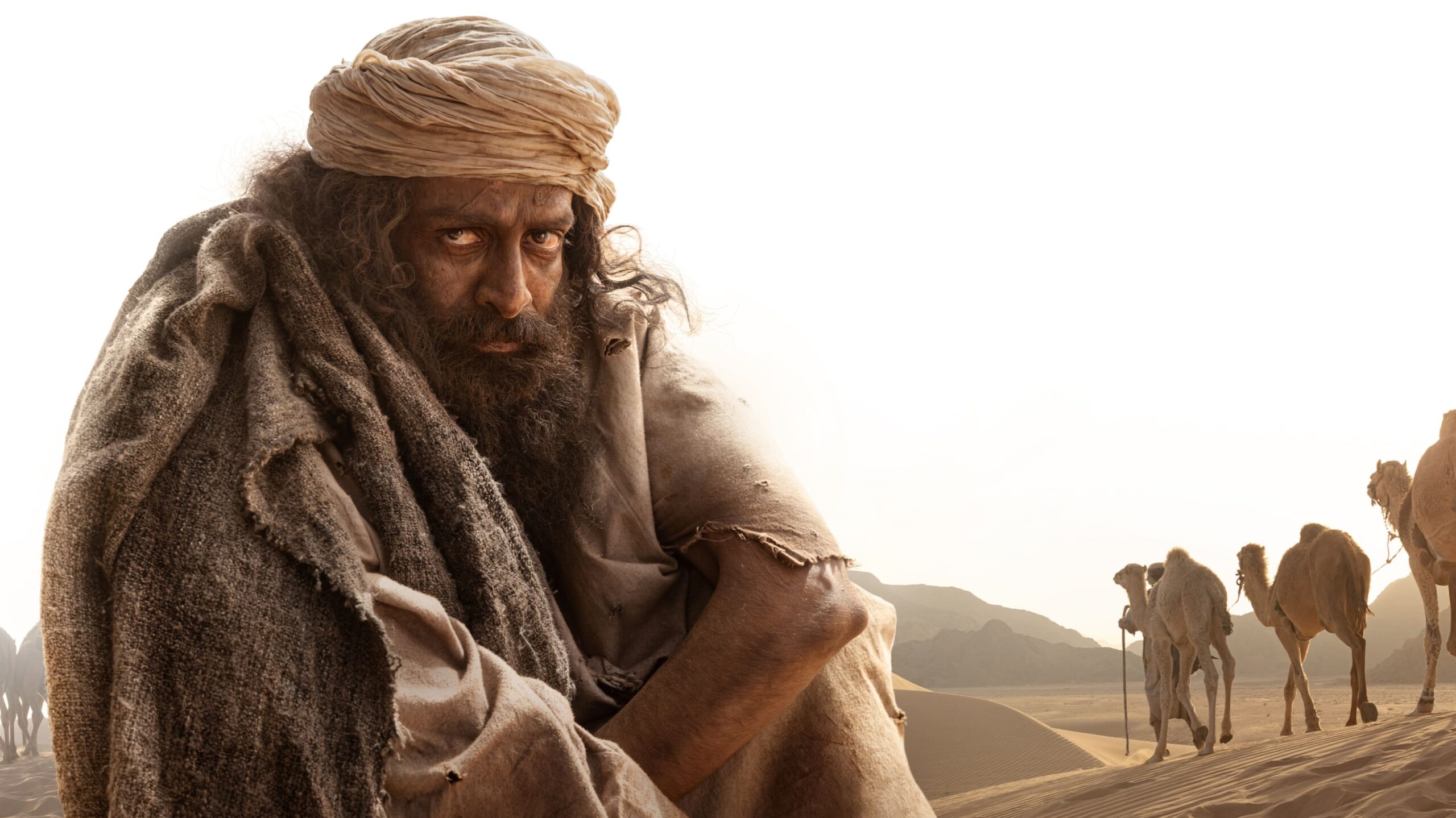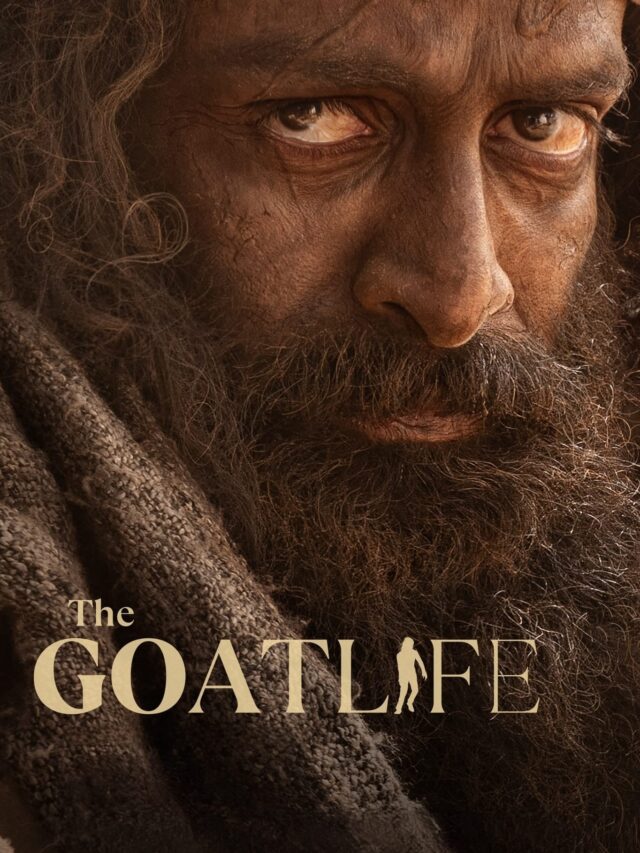Review of the film Aadujeevitham – The Goat Life: Prithviraj Sukumaran gives one of the best performances of his career, making up for the film Blessy’s flaws. He gets off to a somewhat rocky start, but he rises to the occasion and does a fantastic job of capturing the essence of Najeeb.
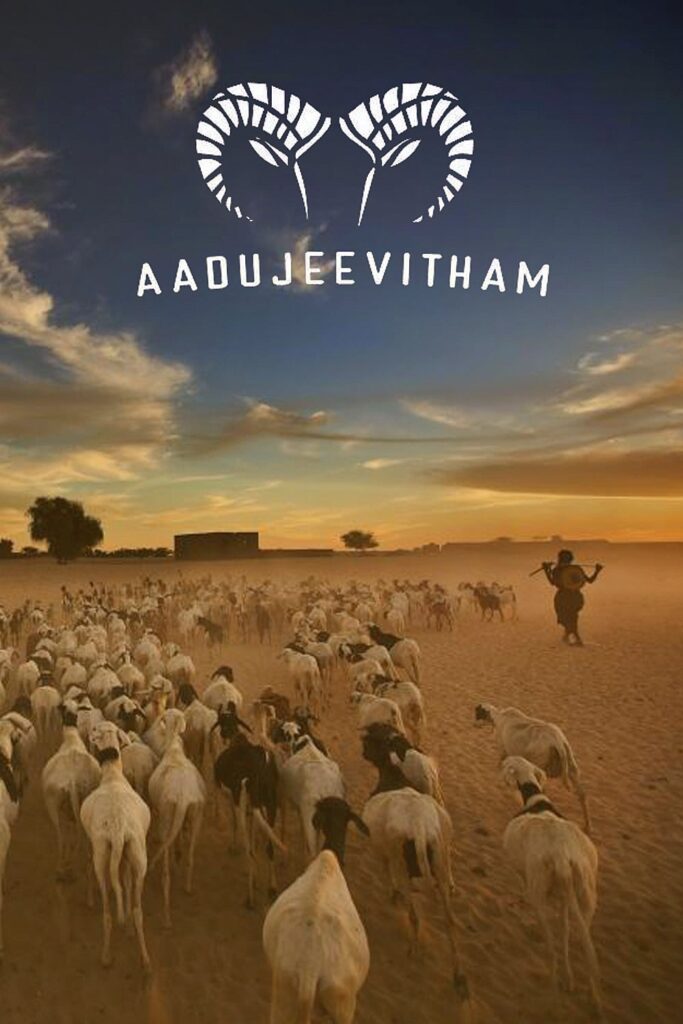
Review of the film Aadujeevitham – The Goat Life: When Najeeb (Prithviraj Sukumaran) realizes that his boss is beckoning him for meals, he dashes into the tent. One of the Arabs offers him a giant, thick roti, which he reluctantly accepts after realizing it’s named “Khubus.” It’s not as silky or elegant as the ones we buy in stores, and it takes work to rip. Tears fall down his cheeks as he forces it down his throat. Maybe there was a chance he might be allowed to leave by the Arabs till then. But when food and drink finally satisfy Najeeb’s chronic hunger and thirst, he is forced to confront the hard reality that he has been sold into slavery and is now living in the middle of a Saudi Arabian desert on a masara, or farm, where sheep and goats are reared.
Aadujeevitham (The Goat Life) is one of the riskiest modern films, yet because it’s based on a well-loved and best-selling novel, not many people were worried about how well it would work out. This was mostly because Blessy was directing the picture. It was obvious that the director, who is skilled at depicting human emotions on screen, would do the survival drama justice, and he did.
Blessy’s film opens with a spectacular visual of a sandstorm, followed by a scene of the peaceful desert, unlike the novel, which starts (spoilers ahead) after Najeeb escapes from the desert. With a slow upward pan, the camera moves from the dunes to the sky, concentrating on a constellation. Najeeb puts his face into the water and carefully drinks, creating the illusion that he is ingesting something divine. The sky seamlessly changes into its mirror in the water. It’s evident when the camera pans out that Najeeb is living the Goat Life in the masara, surrounded by a herd of goats.
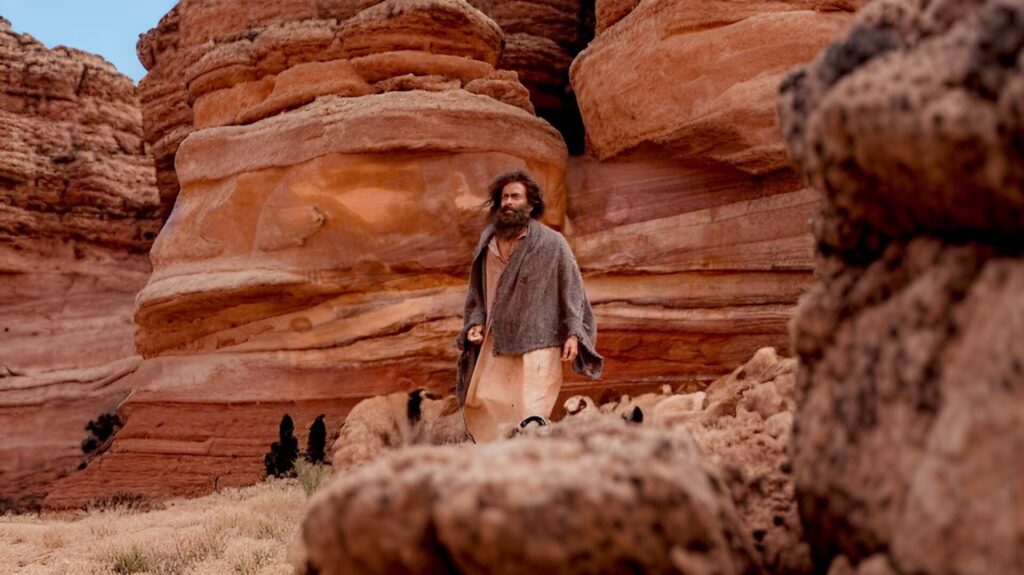
Blessy, who also wrote the script, makes it clear right away that he has changed Benyamin’s story. However, there were concerns regarding Blessy’s handling of these themes because the work heavily relies on Najeeb’s monologues and inner thoughts. But he skillfully substituted Prithviraj’s acting skills for the monologues and inner monologues, and the actor—who was fully aware of this task—went above and above to give an engaging performance. Prithviraj appeared to be having trouble portraying Najeeb at first, especially because of his habitual rigidity in delivering lines, but as soon as Najeeb started to show signs of concern, he swiftly improved.
Because Najeeb didn’t understand Arabic, the novel had the luxury of hiding what his managers were saying to him in that language, but since the bosses were visible all the time, the movie had to come up with a different strategy. When the Arabs were speaking to Najeeb or his buddy Hakeem (who was later shipped off to another masara), Blessy showed great ingenuity by letting the audience experience their problems without the use of subtitles. In order to keep us informed, subtitles were only used while the Arabs were speaking to each other.
Even though Aadujeevitham doesn’t go into as much detail as the novel does about the suffering Najeeb endures at the hands of his employers, it makes good use of the few examples that are presented to highlight the extent of his suffering in the desert—where he isn’t even allowed to take a shower or clean himself because the Arabs buy water for exorbitant prices. He receives terrible beatings from his masters to teach him every lesson in this new society. One such beating left him with a fractured leg and another involved a shotgun blast to the foot.
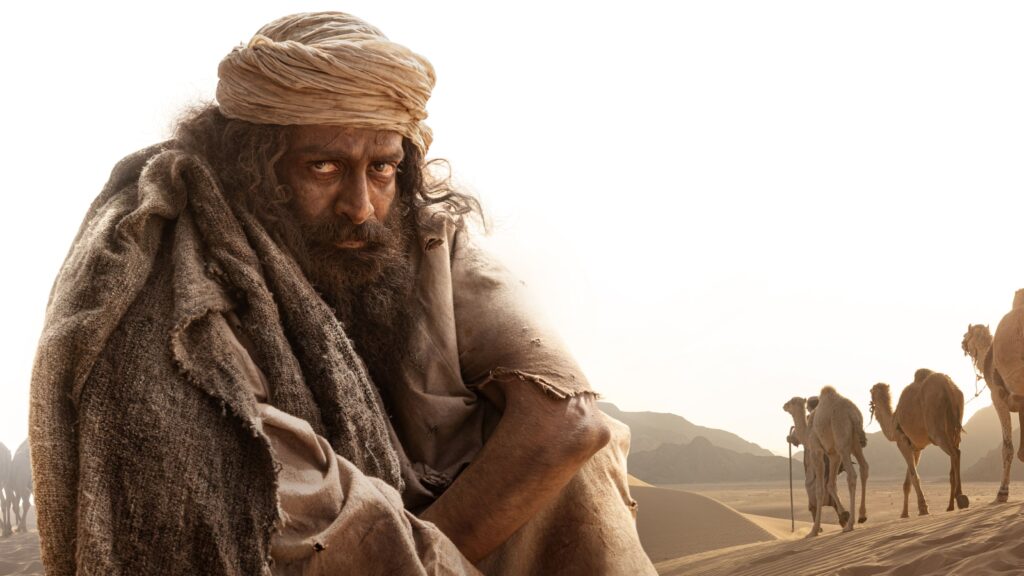
The goats, who at first saw Najeeb as an outsider, eventually grow to care for him as they see his suffering, demonstrating the capacity of animals to understand feelings that people sometimes take for granted. In a heartbreaking scenario, after Najeeb is hurt and calls out to Allah, a goat comes to soothe him and lets out a loud bleat. This causes others to assemble and carry Najeeb back to safety, protecting him from more damage.
Blessy masterfully modified the source material to enhance the visual language of the movie, including scenes such as Najeeb being attacked by vultures and letting him see his reflection after months of living in filthy conditions. The flashback scenes that showed Najeeb’s life back home and his times with his wife Sainu (Amala Paul) were quite stunning. Their profound love for one another was beautifully depicted through scenes and a song, highlighting why Najeeb decided to persist and look for a way out despite facing such adversity. The instances where Najeeb remembers Sainu through the aroma of handmade pickles that are sent in a bottle were especially noteworthy.
The movie picks up speed when Najeeb gets back together with Hakeem (KR Gokul), who presents Ibrahim Khadiri (Jimmy Jean-Louis), a new slave. They soon escape the masara onto the desert, which is like a vast, never-ending sea. Sreekar Prasad’s engaging editing, especially the smooth transitions, brought the breathtaking visuals by cinematographer Sunil KS to life. The sequences in the desert, where they had to endure more hardships without food or water, were both riveting and terrifying. Like the literature, the film portrays Khadiri as the personification of Prophet Moses and emphasizes God’s presence throughout difficult times. But only Najeeb manages to cross the desert sea in the end.
Even though Blessy painstakingly picked just the right scenes for the Aadujeevitham movie, his script did a poor job of creating enough suspense throughout. Many of these, especially the ones where things get hotter, end too soon and don’t go deep enough to produce a satisfying conclusion. It was a terrible artistic choice for the script to leave out or purposefully avoid important passages from the novel, like Najeeb’s visceral response to rainwater touching his body after months of starvation and the night he feels strong physical cravings and seeks comfort in the warmth of a female goat.
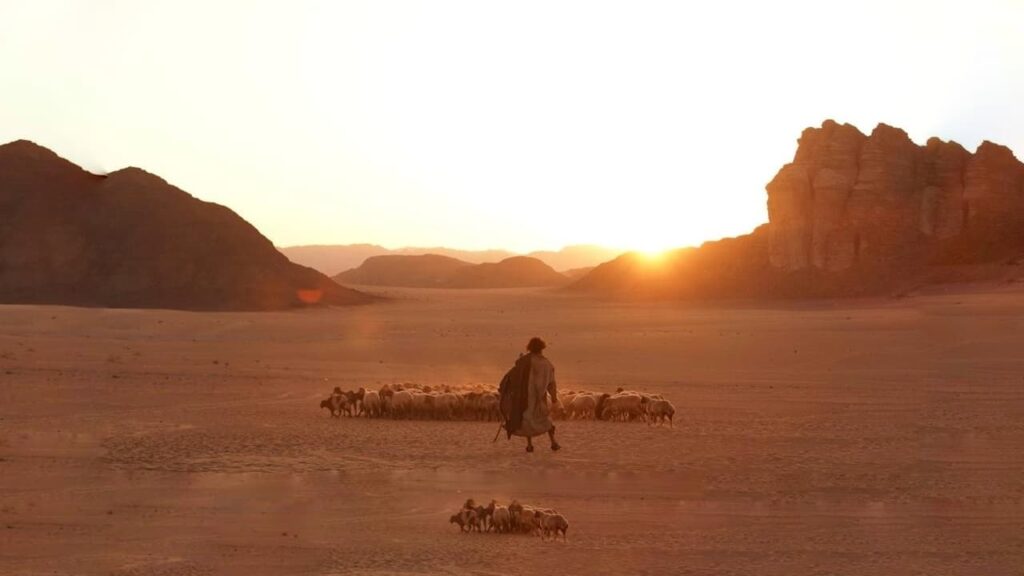
The film’s powerful depiction of Najeeb’s physical decline, most notably when Prithviraj completely undresses to display his naked and malnourished physique, made the omission of the moment showing sexual contact seem needless and even contradictory.
But Prithviraj gives one of his greatest performances to date, making up for these flaws and propelling Aadujeevitham forward. He gets off to a somewhat rocky start, but he rises to the occasion and does a fantastic job of capturing the essence of Najeeb. In the last acts, he displayed astonishing delicate facial expressions and speech patterns that resembled those of a goat that had been isolated for a long time. For an actor who has frequently come under fire for finding it difficult to portray strong feelings, Aadujeevitham is a noteworthy accomplishment. Although she had little on screen time, Amala Paul was excellent as Sainu. Gokul gave a mediocre performance at first, but he was excellent in the latter escape scenes, and Jimmy was a perfect fit for the role of Khadiri.
Resul Pookutty’s sound design was excellent, especially in the desert scenes. Ranjith Ambady’s makeup and Stephy Xavier’s clothing design are also deserving of special recognition. There should be praise for Prasanth Madhav’s production design as well. However, AR Rahman’s music, especially in the Keralan passages, was the biggest disappointment in Aadujeevitham. Apart from “Periyone,” Rahman’s songs also frequently seemed out of sync with the emotions depicted, failing to arouse any emotions or improve the vivid visual storytelling.
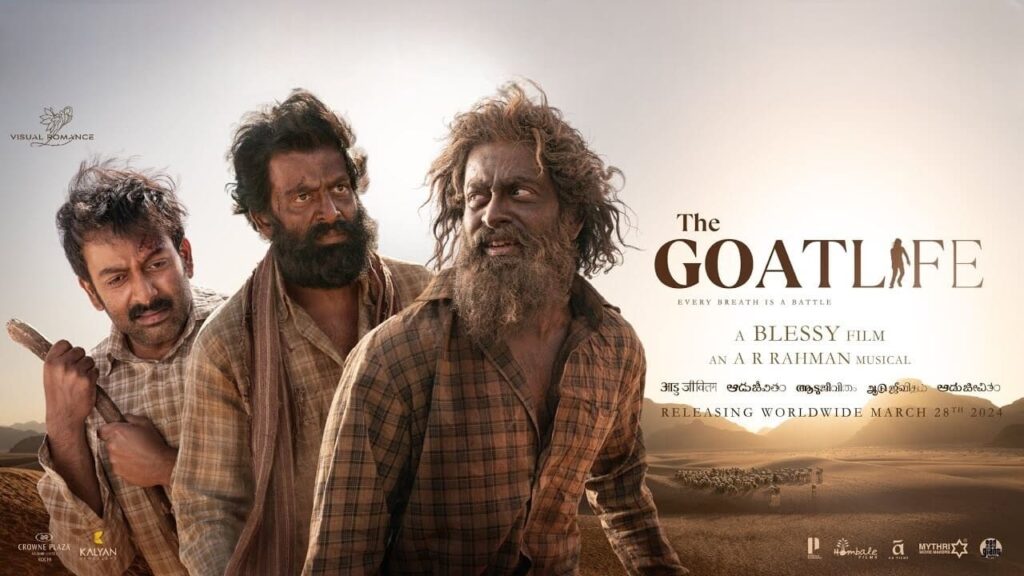
Prithviraj Sukumaran, Amala Paul, and Jimmy Jean-Louis are among the cast members of the film Aadujeevitham. Blessy is the director.

